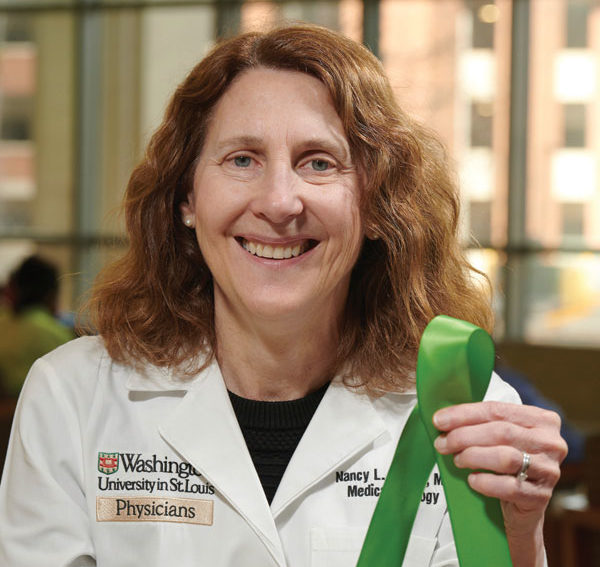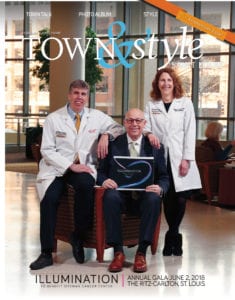There will be an estimated 1,735,350 new cancer diagnoses in 2018, according to the American Cancer Society. For those who get the heartbreaking news, it often means the beginning of a long and difficult journey. Through groundbreaking research and treatment, the Alvin J. Siteman Cancer Center at Barnes-Jewish Hospital and Washington University School of Medicine ensures it is a road no one has to travel alone. The center is a leader in cancer treatment, research, prevention, education and community outreach, providing care to thousands of patients from across the country.

According to director Dr. Timothy Eberlein, Siteman currently is working on breakthroughs in personalizing cancer treatments. “Personalization offers more favorable outcomes because it better targets cancer cells,” he says. One of these more individualized treatments is CAR-T cell therapy. Siteman is one of the first centers in the nation to offer the treatment as part of a clinical trial The therapy focuses on T cells, which are responsible for fighting off disease as part of the immune system. In cancer patients these cells lose the ability to recognize or destroy cancer cells. “CAR-T cell therapy uses a patient’s own T cells to stimulate the immune system to specifically identify and destroy cancer cells,” Eberlein explains.
Siteman also is using personalized vaccines to create more effective treatments. Eberlein says to create vaccines tailored to a individual, doctors do a genomic analysis on the tumor. “We identify the specific mutations and develop a vaccine that only identifies the tumor,” he notes. “A vaccine made to treat my cancer wouldn’t work to treat your cancer, and vice versa.” The targeted nature of the vaccine means that only cancer cells are destroyed. Eberlein compares it to a surgical treatment when both healthy and cancerous tissue have to be removed. “These personalized treatments identify and target only the cancer cells, not normal ones,” he says.
These more t argeted approaches can have major benefits for patients. “The more personalized you can make treatment, the fewer side effects you tend to see,” Eberlein says. One example he provides is hair loss during chemotherapy. The reason patients lose their hair is because the drugs target rapidly dividing cells, not specifically cancer cells. Since the cells that grow your hair also divide rapidly, they too are affected. “It has nothing to do with your cancer, but chemotherapy doesn’t distinguish the difference,” he says. Personalized treatment better differentiates between cells to more effectively target the disease; the hair loss example only scratches the surface of eliminating side effects. According to Eberlein, these new treatments can help reduce all side effects including nerve damage caused by chemotherapy.
argeted approaches can have major benefits for patients. “The more personalized you can make treatment, the fewer side effects you tend to see,” Eberlein says. One example he provides is hair loss during chemotherapy. The reason patients lose their hair is because the drugs target rapidly dividing cells, not specifically cancer cells. Since the cells that grow your hair also divide rapidly, they too are affected. “It has nothing to do with your cancer, but chemotherapy doesn’t distinguish the difference,” he says. Personalized treatment better differentiates between cells to more effectively target the disease; the hair loss example only scratches the surface of eliminating side effects. According to Eberlein, these new treatments can help reduce all side effects including nerve damage caused by chemotherapy.
Along with research and treatment, Siteman also engages in community outreach and education to help reduce cancer risk. “Half of all cancers are preventable,” Eberlein says. “We are trying to educate people as to how they can reduce their risk of developing the disease.” The center has programs in North St. Louis, southern Illinois, southeast Missouri and other areasdealing with health care disparities. Along with prevention education, the programs provide screenings to help identify different cancers in their earliest stages.
Siteman is one of the largest cancer centers in the country, and to continue doing its profound work, it can’t solely rely on government grants. “While these grants are very significant, they don’t pay for all of the research,” Eberlein says. “We have to supplement those payments with other funding, and the source tends to be philanthropy.” He notes that Siteman is extremely fortunate to have a community that rallies around it. Generous donations have allowed its research program to develop new ways of treating and identifying cancer to better support patients. “Without that money, there is just no way we could have the success we’ve had or make changes so quickly to help patients,” he says.
One of the major fundraising events that benefits Siteman is the Illumination Gala. Since 2007, the event has raised $22 million to support the Foundation for Barnes-Jewish Hospital’s Cancer Frontier Fund, and $3.3 million was raised in 2017 alone. The Cancer Frontier Fund was created by Amy and Bill Koman to help Siteman researchers continue to make innovative breakthroughs in cancer treatment and prevention. This year, the Illumination Gala will be held June 2 at The Ritz-Carlton. “We look forward to seeing everyone there and thanking them for their support,” Eberlein says. “The patients are the true beneficiaries of the extraordinary generosity of the community that gets behind Illumination.”
Pictured above: Dr. Nancy Bartlett and Dr. Timothy Eberlein are passionate about offering the best care for all patients.
Photos: Tim Parker Photography
The Illumination Gala benefits cancer research at the Alvin J. Siteman Cancer Center at Barnes-Jewish Hospital and Washington University. Pictured on the cover: Dr. William Hawkins, Siteman Cancer Center director Dr. Tim Eberlein and Dr. Nancy Bartlett. The event is June 2 at the Ritz-Carlton. For sponsorship or ticket information, call 314.286.0602. Email foundationforbjh@bjc.org or visit illuminationgala.org.
Cover design by Allie Bronsky | Cover photo by Tim Parker Photography








